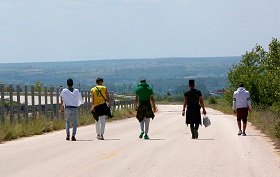Labor migrants in Russia face challenges to keep their jobs: passing of Russian language, history and language tests, acquiring expensive permits, paying monthly fees, all with no guarantee they will be able to work. Moreover, studies show Russians increasingly don’t see migrant workers in a positive light. Temporary and permanent migrant workers play an important role in Russia’s labor force. To what extent can change be made to secure migrants’ rights to work, while also maintaining strong national security policy? Irina Sorokina interviews Irina Ivakhnyuk, Doctor of Economy, Member of the Global Migration Policy Associates, RIAC Expert.
How successfully is the labor migration policy implemented in Russia? Are there any gaps between official migration policy and the real practice of regulating migration? If so, what are the weaknesses, how serious consequences can they have for the migration situation in the country as well as for the migrants themselves?
Labor migration policies are carried out inconsistently, impulsively, contrary to the economic interests of Russia and not in compliance with the provisions of the 2012 Concept of Migration Policy.
I draw on evidence not only from my experience working with migrants, but also from the theory of migration policy and analysis of measures taken at the legislative and law enforcement levels.
For example, the 2012 Concept of Migration Policy was designed to create conditions for promoting the immigration of qualified specialists and other foreign workers needed on the Russian labor market. What happened in reality? All migrants from visa-free countries could obtain patents to work not only for physical entities, as it was stated at first, but also for legal entities. From 2015 on, the conditions for obtaining patents were expanded, requiring prospects to pass the Russian Language, History and Fundamentals of Legislation tests, and the process became much more expensive.. The Federal Migration Service reported receivingbillions of additional rubles to the Russian budget, while many migrants had to shift back to illegal employment without a labour contract. The russian economy has obtained nothing from this, except for the growth of the shadow labour market. What did the migrants get? Extra barriers to legal employment.And nobody cared about the “qualified specialists” at all.
I should separately speak about the Russian Language, History and Fundamentals of Legislation tests, which are an absurd legal norm that appeared under the guise of caring for the migrants' adaptation. Why would temporary labour migrants or seasonal migrants take this exam? Will they be able to actively communicate with Russian citizens at the extremely low level of the Russian language tested? Or defend their rights in court? The only motive for the introduction of this legal norm ismercantile, and setting barriers. How many efforts are taken? The best Russian universities are involved! And for what reason?
Another example: In 2018, Russia adopted a law to change migration record, prohibitingmigrants from being registered at work. It seems to be the right measure, because (as a rule) they do not live where they work. And why, of course, they need to live there? However, it is important that the migrants be at their place of registration. During the work day, of course, they are not. What has the new law changed for migrants? It made registration even a bigger obstacle, and made them more vulnerable to law enforcement agencies that can check them at any time and detect a violation of law.
The consequences of such discrepancies between the norms defined by legislative acts and the actual practice of regulating migration can be most serious for Russia (let us recall FMS blacklists). The risks are weakening the migration potential of the CIS countries directed towards Russia, if not eliminating their potential altogether, and decreasing the possibility of the influx of labor the country needs. In addition, there may be serious geopolitical consequences, such as claims from the Central Asian states about violations of the rights of their citizens who come to Russia for the purpose of employment. And this means weakening of integration tendencies in the space where Russia claims (quite reasonably) to be a leader.
What are the practical peculiarities of the patent system? Has the patent system simplified the migration process or complicated it even more?
At first, when the practice of patents had just been introduced in 2012, the procedure for obtaining them was very simple, maybe even unnecessarily simple, since even medical examination was not required (this burden was shifted onto the employer as a physical entity). As a result, in 2013 and 2014 the number of patent applicants increased dramatically.
In 2015, with the introduction of the new patent rules, the number of people who actually received patents decreased. At the same time, the number of people entering Russia indicating the purpose of entering as “work” continued to grow in 2015, in 2016, and even more in 2017. What does this mean? This confirms the well-known truth: toughening the conditions for entry and employment inevitably leads to an increase in illegal migration.
In fact, obtaining a patent is as bureaucratically complicated as obtaining a work permit. Additionally, there is a condition of monthly patent payments, different in amount depending on the region. The authorities call this the “advance tax payment” (although no one compares it with the real wage of the migrant, and there is no evidence that migrants “pay extra” tax, if the amount of their income turned to be higher). The fact is, that this is a payment for the right to work in Russia, which is a direct violation of international ILO conventions, which state that information and organizational services for the employment of a foreign citizen should be provided free of charge.
How profound are the questions regarding working conditions and residence of migrants in the Russian Federation worked out in the legislative acts? Has the Concept-2018 brought in anything new in this regard?
It wasn’t until 2014 that a chapter on the employment of foreign citizens was included in the Labor Code of the Russian Federation. This is a great achievement, because for 20 years before this, the active influx of foreign labor had not been legally secured.
I mentioned earlier the law pertaining to changes in migration records in 2018, which, relatively speaking, can be considered regulations over the living conditions of migrants. In reality, the issues of working and living conditions of migrants are the responsibility of the employer (in accordance with the employment contract), and not of the state.
It should be noted that the 2018 Concept does not pay the slightest attention to this issue, moreover, it never mentions the “rights of migrants” — neither labor, nor social, nor legal. There is language about the rules for migrants, the transparency of procedures, and the services for migrants, but not a single word about the rights of the migrants! Symptomatic! Especially in the light of preparations for global signing of Global Compact for Safe, Orderly and Regular Migration, a document implying an approach based on human rights as the only possible approach from the point of view of international migration law.
What are the most urgent problems regarding the working and living conditions of migrants in Russia? How are they being solved, how should they be solved?
The internal discrepancy of the Russian migration legislation is that the supremacy of state interests (economic, political, demographic, national security interests) does not correlate with the understanding that there are real people behind the notion of "migration flows". People who come to Russia to work, live, and stay among Russian society. And if they are treated mechanically, as a “flow,” “work force,” “a means of compensating for a shortage in the labor market,” it leads to the deformation of social relations in society. However, the authorities do not think about that.
For example, it is obvious that the change in the order of migration registration of foreign citizens adopted in 2018 will not bring any results in terms of providing reliable information about the place of temporary residence of migrants. And it will certainly not protect the migrants from the arbitrariness the employers and officials.
A reasonable alternative measure would be turning the migrant registration into a simple notification and leaving the category "receiving party" behind. In this case, migrants would be required to notify the local territorial migration department (in-person, by mail, or in electronic format) about their real place of stay. Responsibility for the accuracy of this information is attributed to the migrant, and cases of violation would be punishable by law. The advantages of this procedure are its simplicity, minimization of barriers for legalization of migrants in Russia and for obtaining permits, as well as the absence of any corruption component.
Does the trend of perception of migrants as a problem risk group in the Russian society remain?
Levada Center surveys show an increase in xenophobic attitudes in the Russian society. Over the past year aversion to migrants has increased significantly. 2/3 of the population believe that the state should reduce the migration flow.
No wonder. The state itself cannot decide on its own attitude towards migrants. On the one hand, there seems to be an understanding that migrants are a constituent part of Russian society, necessary and useful for the country from the point of view of economy, demography and geopolitics. On the other hand, the public policy is getting tight in relation, for example, to labor migrants, as more new restrictions are being introduced. How can common people figure it all out? People notice that the state perceives migrants as a problem rather than a development resource and adopt this model of perception.
However, it is important to distinguish two fundamentally different categories of migrants: those who come to live permanently in Russia, and temporary labor migrants. The society treats these two categories differently. Temporary migrant workers are perceived with greater anxiety, because there are more of them and because it is clear that they are “temporary workers” here, their attitude towards Russia is purely pragmatic, they are not emotionally connected to this country, they are not going to build their lives according to Russian regulations, and therefore “one can expect anything from them." What’s dominating in this perception is that labor migrants seem to be completely poorly educated people, hired for unqualified labor, and not able to behave. Which is not always the case.
What barriers hinder the inclusion of migrants in the Russian society?
A distinction must be drawn between permanent and temporary migrants. Temporary migrants who arrived for the purpose of employment focus on work. Providing them with legal employment opportunities, decent working conditions, equality of labor rights, and the implementation of the principle of equal pay for equal work is the way to include migrants in normal labor relations and to ensure their proper place in the Russian society. However, the possibilities of legal employment are artificially narrowed, working conditions often leave much to be desired, there is no real equality of rights and payment — all these are the “barriers”. There are also administrative barriers that are lined up locally, apparently from the excessive diligence of local officials. For example, family members of migrant workers face problems in extending their temporary residence permit. Children get the extension, and the wife does not. The male migrant has to work, get a patent, and his wife has to bring up children having a little baby on breastfeeding.
With regard to permanent migrants, in addition to their job, all the rights guaranteed by the residence permit and citizenship are important for them to become part of the Russian society. The realization of these rights is hindered by bureaucratic obstacles, weaknesses in the legislation, and the notorious registration in the place of residence. For example, the procedures for renunciation of a citizenship to apply for the Russian citizenship are absurdly complicated, one can endlessly wait for the decision of the authorities of the country of departure. The forms of the required certificates change (for example, adding language that "... the issue on the application of *NAME SURNAME* has not been resolved through no fault of the applicant"), so one needs to address the embassy again. In the end, migrants are forced to simply buy these certificates at the embassies of their countries. This complicated path to citizenship makes migrants vulnerable, they are forced to violate the law, they are afraid that someone can find this out, so they try to live quietly, minimizing contacts with the authorities. This can hardly be called a full-fledged "inclusion in the Russian society."
What policy does the government pursue to reduce the level of discrimination against labor migrants and mitigate negative attitudes towards them?
Unfortunately, there is no understanding at the official level that the integration of migrants is a bilateral process, the success of which depends on both sides — the migrants themselves and the society accepting them. While now the state places the responsibility for the integration of migrants on the migrants themselves. This is evidenced by the fact that the Russian Language, History and Fundamentals of Legislation test was introduced with a focus on integration (passing the exam means being ready to integrate, not passing the exam — not ready).
In 2014, when the chapter on employment of foreign citizens was included in the Labor Code of the Russian Federation, one could seemingly expect certain equality in labor rights of foreign and Russian citizens, however, the chapter was purely technical in nature and only changed the procedures of hiring foreign workers.
There is practically no action taken in the Russian society to explain the role of migration and migrants for the future development of Russia. While society also needs to be adapted to the new migration reality, when the presence of migrants in the labor market is a necessary resource for the country's economic development.
The good news is that the media have decreased the degree of migrant-phobia in recent years, the attention is not focused on the ethnic affiliation of offenders, as it was before, rare news stories show that migrants come to Russia in search of work, not out of choice but of necessity, and that it helps them to support their families who live in their homeland. It is also possible that this happens «on the order from above».
How are migrants aware of their rights? Do they manage to assert their rights?
Due to the efforts of migrant, human rights organizations, private employment agencies, international organizations, as well as pre-departure training in the countries of departure, migrants have some idea of their labour, social, and legal rights. However, both human rights organizations and lawyers working with migrants will confirm that in case of violations by the employers and the police, migrants rarely manage to assert their rights before the courts. The reasons are both in the lack of knowledge of Russian laws, in the low level of Russian language acquisition, in the uncertainty of their position in a foreign country, and in the open discrimination of foreign citizens by the Russian judicial system. Migrants bring the disputes to the court only if absolutely necessary, only when it comes to personal freedom. Most often, they avoid applying to official judicial structures, solving their problems within ethnic communities.







